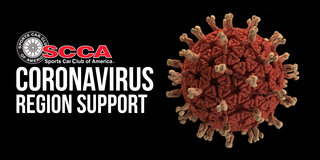
Each community and SCCA Region has been impacted differently by the onset of the coronavirus. As such, response has been varied as well. Below is some useful information that we hope will help you navigate COVID-19 regarding your upcoming events. And, make sure to stay up to date on SCCA’s official announcements.
Making the Decision
You are strongly encouraged to read Steps to Plan, Prepare and Proceed with a Mass Gathering, and stay abreast of local and state agency communications regarding access to event site and size. This resource offers examples of mass gatherings (conferences, festivals, parades, concerts, sporting events, weddings and other types of assemblies). It also lists considerations to assist in deciding to postpone or cancel a mass gathering, including:
- The overall number of attendees
- The number of people attending who are at greater risk of more serious illness after contracting COVID-19
- The density of attendees within a confined area
- The potential economic impact to participants, attendees, staff and the larger community
- The level of transmission in your local community and the level of transmission in the areas from which your attendees travel
- If there are ways in which to significantly reduce the number of attendees
If your event must be suspended due to local/state guidelines, be sure to review your contracts to determine what options may be available to you.
On-Site Suggestions
If local mandates have been reviewed, venues have been contacted and the decision to continue with an event has been made, below are some key prevention strategies and suggestions you can use on-site to help minimize the risk of spreading novel coronavirus.
Key Prevention Strategies
- Promote daily practice of everyday preventive actions:
- Stay home when you are sick, except to get medical care
- Cover your coughs and sneezes with a tissue, then throw the tissue in the trash
- Wash your hands often with soap and water for at least 20 seconds, especially after going to the bathroom, before eating, and after blowing your nose, coughing or sneezing. If soap and water are not available, use hand sanitizer that contains at least 60% alcohol.
- Avoid touching your eyes, nose and mouth with unwashed hands
- Clean frequently-touched surfaces and objects daily
- Provide COVID-19 prevention supplies to event staff and participants—such as hand sanitizer with at least 60% alcohol, tissues, trash baskets, disposable face masks and cleaners/disinfectants
- Promote messages that discourage people who are sick from attending events
- Plan ways to limit in-person contact for staff supporting your events
- If possible, identify a space that can be used to isolate staff or participants who may become ill at the event
- Develop flexible refund policies for participants
Onsite Event Operations
Operations
- Do not provide community beverage coolers. Suggest participants bring their own, or have water available in opened cases, but not chilled. Recommend no use of coolers as the touching of cooler lids can cross-contaminate.
- Use disinfecting wipes or disinfectant spray and disposal towels to wipe down equipment, supplies, shared work areas and surfaces between uses, shift changes and frequently throughout the day.
- Close events to spectators.
- Ensure there are plenty of hand washing stations in and around the facility, including permanent restrooms and rented, portable handwashing stations.
- Communicate ahead of the event to participants with details on additional precautions that the Region is taking. Encourage participants to come prepared to protect themselves and their equipment.
Specialty/Work Assignments
- Each specialty location should be equipped with appropriate disinfectant, hand sanitizer, etc. Disinfect areas during any staffing changes.
- Wipe down T&S areas including computers/mice between heats. Offer masks to close-quarter workers.
- Use baggies to transport disinfected equipment, supplies to corner stations and other specialty locations. Disinfect after use.
- For indoor specialty areas like Registration, Timing & Scoring and Race Control—do not sit right next to each other. If space permits, leave at least a chair-width, preferably more, between people.
Registration
- If registration is held indoors, limit the number of people permitted inside in lines.
- Registrars should not handle membership cards. Have member hold it up and visually check validity.
- Have wristbands or event credentials on a table for participants to pick up, or have registrar just hand it to the participant to put on.
- Do not handle waiver clipboards. Have waivers sitting in a place accessible by the participant. Have them sanitize their hands before touching the pen or disinfect the pen after they use.
Tech
- Self-tech w/oversight. Have driver perform functions to verify equipment where possible; wear nitrile gloves* (nitrile preferred to latex due to allergies).
Driver & Worker Meetings
- Conduct all driver and worker meetings outside or broadcast over PA system, FM radio station and/or via email.
Social Activities
- Suspend social aspects of the event, i.e. trophy presentations, meals, etc.
- Worker Lunches – pre-assemble lunches for a grab & go service
- If a participant dinner is provided, have the food served and provide To-Go containers so people may take it back to their camping and paddock areas.
- Discourage eating in indoor/enclosed locations
- Limit physical contact. Refrain from hugs, handshakes and high-fives.
*Note: The CDC has not made a recommendation for the public to wear disposable gloves in order to protect against COVID-19. If disposable examination gloves are worn, recommended hand hygiene procedures must still be followed before putting gloves on and after removing them. Avoid touching your face, eyes, nose and mouth. Gloves should be changed as often as you would wash your hands. Gloves rip easily and are not durable for long wear. Gloves provide a new surface for COVID-19 to inhabit and may not reduce the spread.

